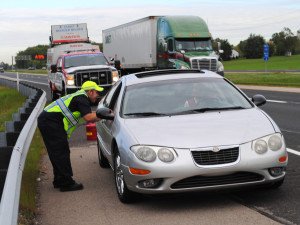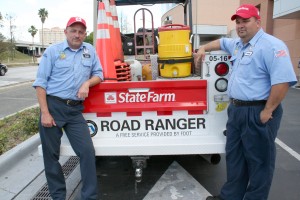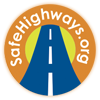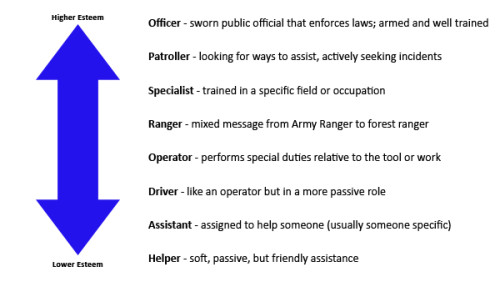What’s in a Name?
Is there a single, appropriate title for a person whose job is to help stranded motorists and support freeway traffic flow? That deceptively simple question drew a remarkable range of responses.
By Leo Rickertsen
“I have consciously referred to … men and women as Service Patrol Officers, not patrollers, operators, drivers, or other terminology … to gain and expand respect for this operational program,” wrote Eric Rensel, Liaison for the TIM Network.
The February 10, 2014, message quoted above in “The Responder,” prompted Safe Highway Matters to reach out to transportation professionals (listed at the end of this article) to determine if there is any commonly accepted descriptor. Here is what was discovered.
PROGRAM NAMES AND FUNCTIONS VARY
The federal government uses the term “Safety Service Patrols” (SSP) to represent incident management programs tasked to minimize the duration of freeway incidents as well as to rapidly and safely restore the roadway to full capacity. Individual states and traffic jurisdictions typically have their own names and purpose for this type of program. SafeHighways.org lists 60 different patrol programs from Alabama Service Assistance Patrol (ASAP) to Freeway Service Patrol (FSP) to Motorist Assistance Patrol (MAP) to … CVS Samaritan … Road Ranger …Highway Helper … (reducing to acronyms) FIRST …HERO … HELP … CHART … ESP … … along with SSP and many others.

The title “Hoosier Helpers” captures a local reference to residents of Indiana and relates a service of assistance with the term “Helper.”
Efforts to unite patrols into a common category or under a single name have been resisted because, understandably, states are proud of their patrol’s name. They have worked hard to have the traveling public recognize the name of the patrol and the patrol’s associated services. This makes it unlikely that there will ever be a universal name. In fact, many states appear to prefer it that way.
If a common patrol designation isn’t possible, could there still be a universal title for their SSP-type personnel? Is there a universal title that elicits respect and captures the vital role performed by these personnel?
PURPOSE INFLUENCES NOMENCLATURE
SSPs and their personnel face both a public and an industry. Most of these traffic professionals prefer a public-facing name that clearly describes the purpose and benefit of the service to the motorist, such as Hoosier Helpers or HERO (Highway Emergency Response Operator). These self-evident names help stranded motorists instantly know that the SSP is on the road to keep everyone safe and to support traffic flow. The public-facing program names also don’t suggest towing or enforcement, which is also important for the motorists’ peace of mind.
“Our program is ten years old and an established brand,” said Iowa DOT Special Projects Engineer Michael Jackson. “Our services are free and provided by Highway Helper staff and we feel it’s most important that people who use the system understand its purpose.” He found the title of “Operator” to most accurately reflect Highway Helper duties, while “Officer” was least accurate because, for Michael, it implied an enforcement role.
Some SSP-type agencies emphasize traffic incident management over motorist assistance. Their personnel respond to crash scenes; assist police, fire, and Emergency Medical Services on the freeway; and clear debris from incidents to prevent follow-on events. These men and women are often first on the scene, responding quickly for the safety of all involved. Many are trained first responders, volunteer firefighters, retired EMS workers. Their training, capabilities and level of responsibility are well beyond what would be attributed to a patroller, driver, or operator.
FUNCTION IDENTIFIES USE
The National Incident Management System (NIMS) implemented “resource typing” to categorize and describe resources commonly exchanged in disasters, generally through mutual aid. For a jurisdiction’s resource manager, this resource typing defines the functions and capabilities of personnel and equipment. In this way, the manager can be confident he or she requests the right resources and avoids miscommunication.
In a similar way, city, county, and state agencies that administer transportation industry programs need to be able to clearly identify the status and availability of resources. “Traffic Incident Management (TIM) teams were formed for this purpose,” said Florida DOT Traffic Incident Management and Road Ranger Program Manager Shawn Kinney. “Common terminology gives all agencies involved in emergency response an accurate common operating picture … it is important to use language that is consistent among responding agencies when referring to the functions and capabilities of personnel and equipment.”
This is the heart of the dilemma: Identify a functional title for personnel that the industry positively recognizes, find common terminology that associates capabilities across agencies, yet name the service so that it’s easy for the public to recognize and remember.
TITLES REFLECT DUTIES, YET DUTIES DIFFER
Safety Service Patrol and similar incident management personnel connect with a much larger group of local, state, and private partners that include law enforcement, fire rescue and EMS; transportation, towing and recovery service providers; medical examiners; hazardous material responders; media outlets and others. One can surmise from this extensive (but by no means complete) list that with so many potential collaborations it is difficult to agree on a single term to represent the title of a person who performs safety service patrol duties.
Survey responders provided a subjective range of recognized titles and associated a level of status among them. The illustration expresses those titles and ranks them to levels of implied status.
The traffic professionals contacted for this article held little agreement on a title. Some were not even sure of the one they currently used. Here are a few representative comments:
“I like ‘Operator,’ I think it is more encompassing,” said Erin Arva, Transportation Operations Outreach Specialist at Gannett Fleming.
“If they respond to and perform incident management services, then I prefer ERT (Emergency Response Team),” said Scott Yinger, Field Operations Manager at Maryland State Highway Administration. “If not, then ‘Operator’ or ‘Driver’ seems descriptive enough for someone who is assisting a motorist.”
Incident and Emergency Management Specialist William James, also with Gannett Fleming, said, “I don’t think the title ‘Driver’ gives them the respect that they deserve.”
“If there’s one title, I’m not sure what it is or if any would convey what that person really does,” said P.E. Rebecca Gibson, in the System Optimization Bureau at New York State DOT.
Bart Graves, Media Relations Coordinator of the CORE Unit at Arizona DOT, agrees. “All fifty of us [states] are different, so any one title is not a good fit because of what our charge is.”
The nearest title Safe Highway Matters could find that might comfortably cross all program capabilities, make sense to agencies, and be clear to the public is “Specialists.” But, currently, it is rarely used and may prove to be a difficult substitute for other titles that are already in place.
TITLES FIT THE WORK

Florida DOT titled its program and drivers “Road Rangers,” a catchy term that is now widely recognized by the public.
A significant majority of responders felt the individual’s title did not need to be consistent compared to other positions in traffic management. That’s because the duties, responsibilities, and expectations of Safety Service Patrols are different in different states and jurisdictions. Any particular SSP’s capability—indeed its status—is already understood among other professional agencies in the community.
With that in mind, a majority also felt it is important that the title convey professionalism. Thus the operative question may be, “how do we title the person to imply higher value without changing already established program names?” As noted, different SSP names and the titles of their personnel have become invested traditions preferred by the individual states. They are understood, familiar and accepted among constituents. Thus, it may not be sufficient to ask if those descriptive job titles best convey the nature of the work and reflect the roles and titles of complementary functions.
The original assertion of TIM Network Liaison Eric Rensel was to use the title of “Officer” for Safety Service Patrol personnel. This assertion has not yet been widely embraced by most transportation agencies, mostly because many SSP personnel do not have the level of responsibility attributable to the field of law enforcement. Yet, SSP personnel engaged in incident response and management are highly respected and valued by the traveling public and are often the first responders to a highway incident scene. Jurisdictions have invested time and effort to establish a “brand” that reflects the purpose and promise of their Safety Service Patrol. The conventions established by each jurisdiction appear to make it difficult, and possibly unnecessary, to change the titles of their personnel as a way to encourage respect and describe capabilities.
Special thanks to survey contributors:
- Erin Arva, Transportation Operations Outreach Specialist, Gannett Fleming, Inc.
- Rebecca Gibson, P.E., NYSDOT – System Optimization Bureau
- Bart Graves, Media Relations Manager, CORE Unit, Arizona Department of Public Safety
- Michael Jackson, Special Projects Engineer, Iowa DOT
- William James, Incident and Emergency Management Specialist, Gannett Fleming, Inc.
- Shawn Kinney, Traffic Incident Management and Road Ranger Program Manager, Florida DOT
- Scott Yinger, Operations Manager – Field, Maryland State Highway Administration

